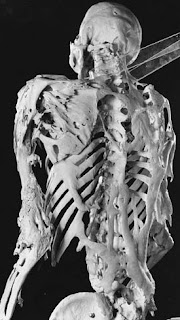
Fibrodysplasia Ossificans Progressiva is a rare genetic disease in which fibrous tissues like muscle spontaneously and irreversibly turn into bone. It's scary. This ossification can affect joints and paralyze the patient. Patients usually lose all mobility by 30 and die by 40 due to paralysis of the diaphragm. Furthermore, this condition is induced by trauma, so surgery to remove ectopic bone causes further bone formation to occur. There is no treatment for Fibrodysplasia Ossificans Progressiva.
I heard a talk by Dr. Kaplan of UPenn who has studied this disease intensively and identified the gene that causes it. He is an inspirational person. Originally a purely clinical orthopedic surgeon, he was so struck by this disease that he dedicated his life to the patients that suffer from it. Over 15 years, he has meticulously investigated patients with this rare genetic defect. From his speech, I realized he is incredibly passionate about his patients even though nothing can be done for them.
His research is a pretty amazing story. His scientific and clinical acumen become very apparent when you think about the difficulty in tackling a disease that happens in one in a million people. Furthermore, most patients with this disease cannot have children, which makes traditional genetic and genomic techniques incredibly difficult.
The disease itself is crippling. Most doctors are unfamiliar with its presentation: short big toes and the overnight growth of tumor-looking bumps on the back, shoulder, and neck. Most doctors will assume this is cancer and biopsy it; this trauma can induce progression of bone formation. I read a paper that looked at iatrogenic (doctor-caused) harm to these patients due to lack of awareness of the disease. The paper also showed that few textbooks (other than those on metabolic bone disease) actually described this disease in adequate detail.
I am glad to have heard this talk by the world's leading researcher and supporter of patients with this extraordinarily rare, debilitating disease.



No comments:
Post a Comment